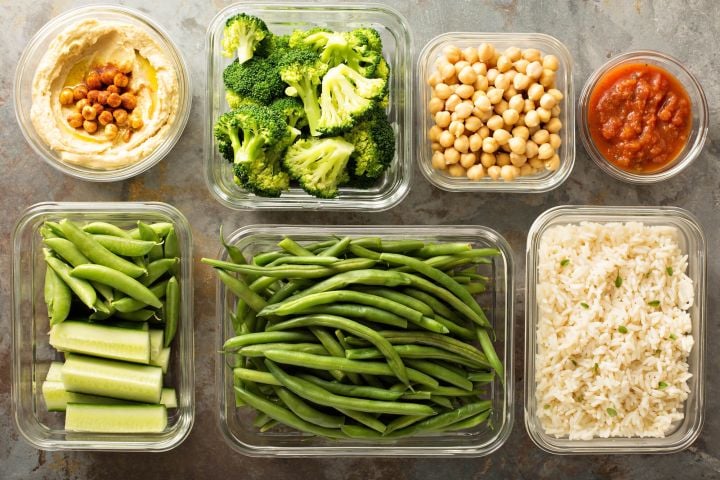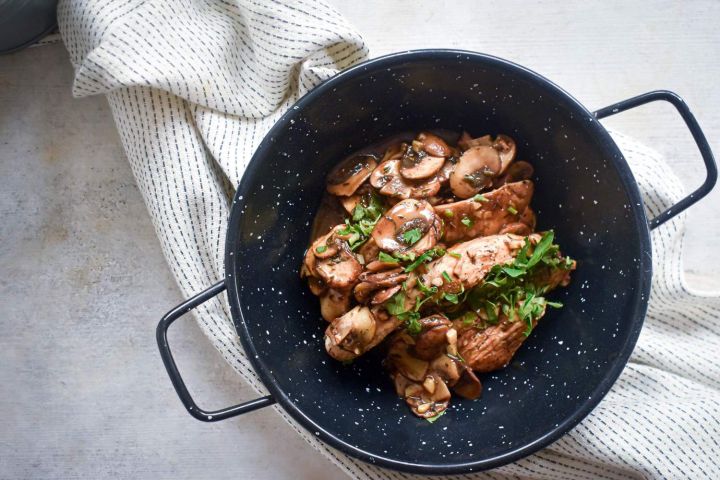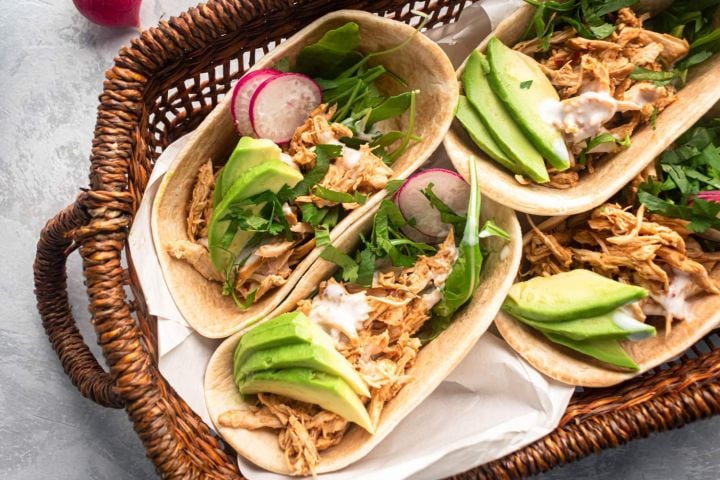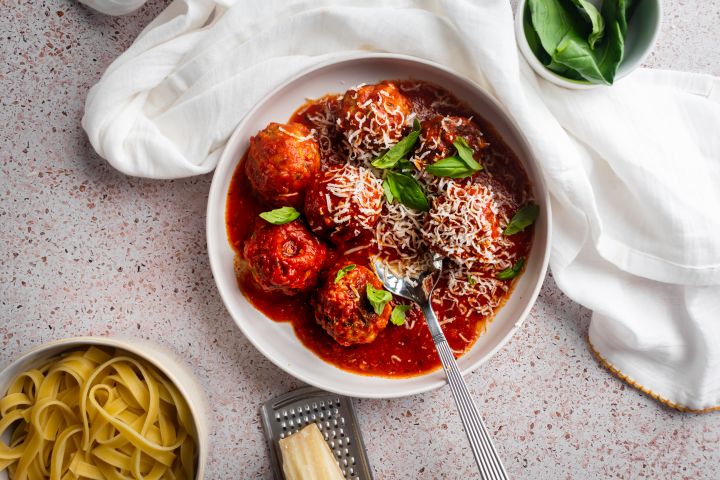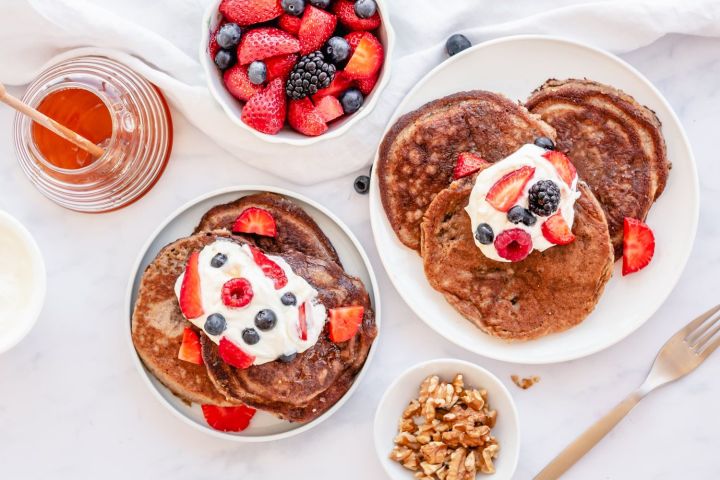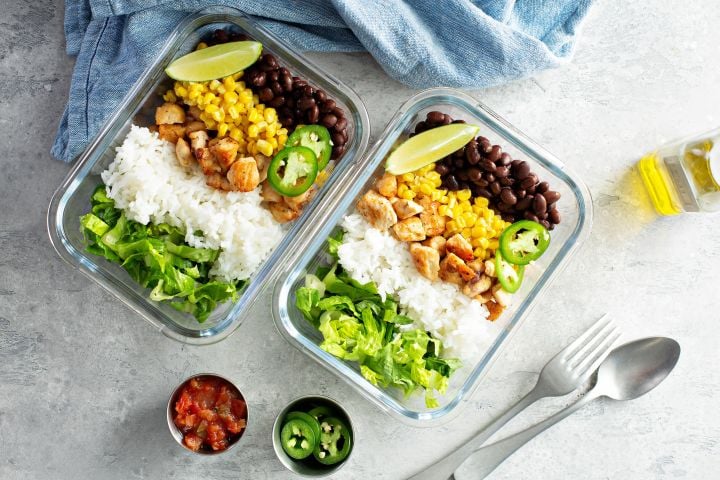The Ultimate Guide to Eggs: Health Benefits, Recipes, and More
Everything you have ever wanted to know about eggs including their nutritional information, health benefits, cooking and storage info, and plenty of healthy and delicious egg recipes.
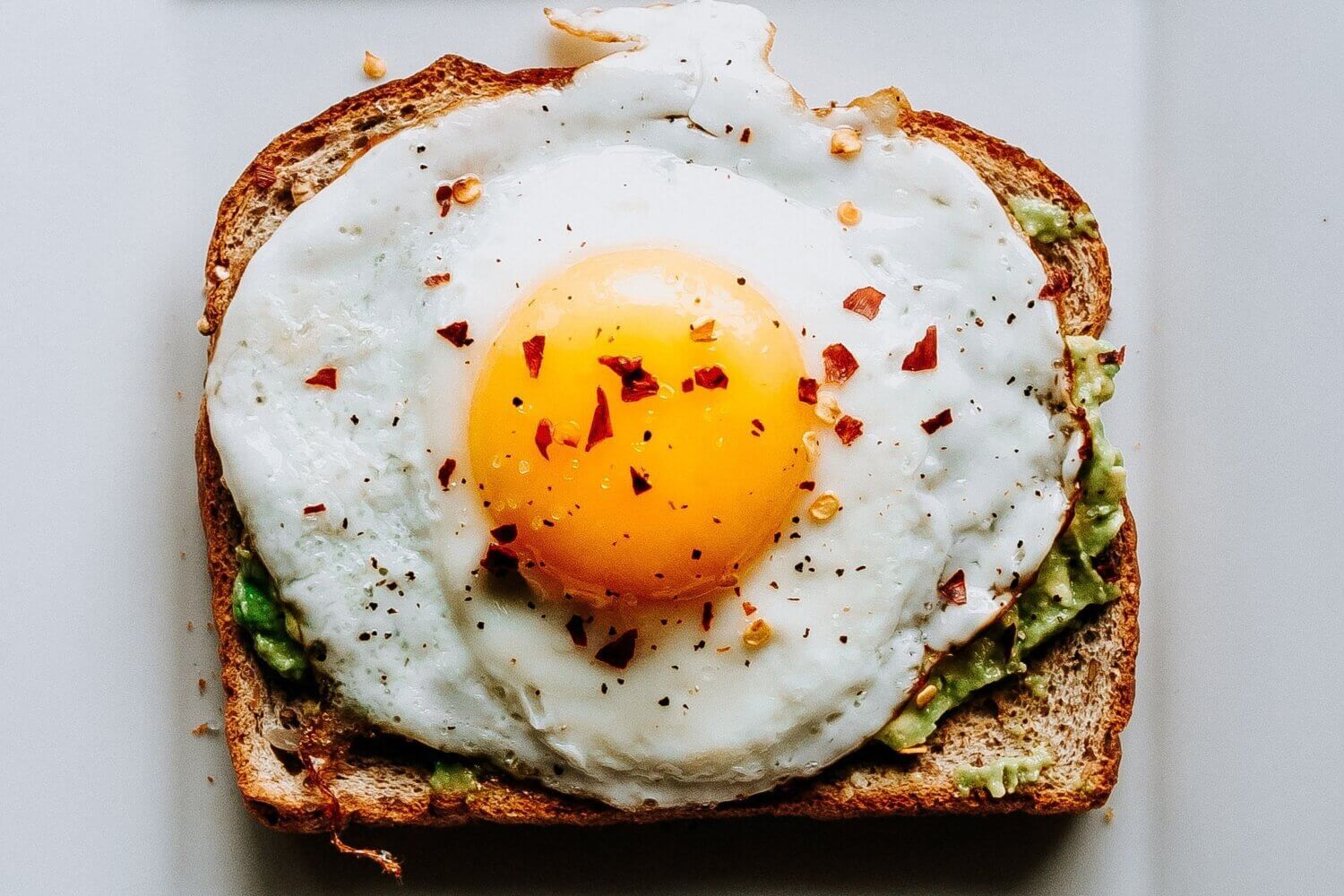
The Ultimate Guide to Eggs contains everything you need to know about these protein and nutrient packed staples.
Eggs. They're good! They're bad! They're good again! But maybe just the whites — no, wait, go ahead and add the yolks back in, they're good for you too!
So which is it? Are eggs an enemy or an ally? I for one, believe it's the latter. And I've come across enough research that backs that up to want to pass the goodness of eggs on to you. Thank goodness, because I am pretty sure I couldn't live without eggs in my life. They are the crux of so many recipes — so many of my recipes — if they proved bad for you, well, let's just not even go there.
Everyone knows that eggs are great for breakfast, of course. But, really, why save them for just one meal? Frankly, they go great with any meal and of course are integral to many baked goods as well. They are the literal glue that holds many recipes together. And, who can resist a nice, sunny-side-up fried egg, that runny yolk oozing out on top of a burger or a hot bowl of Asian vegetables and protein?
Do I have your attention now? Thought so! Eggs are chock full of protein, antioxidants, iron, essential amino acids, and all sorts of other great vitamins and minerals. Don't you think it's about time, then, to explore all the good reasons to eat that incredible, edible, egg-stravagant egg? Come along then, with me!

Are Eggs Good for You?
You may have heard in the past that eggs were bad for your heart because they raised your cholesterol levels. Only part of this is true. Eggs only raise your good HDL cholesterol levels. In fact, studies have shown that the cholesterol in eggs doesn't affect your cholesterol levels in your blood for the worse.
Eggs are low in calories, and high in protein. They also contain vitamins B, A, iron, choline and other good-for-you nutrients. While some eggs may tout that they contain more of a certain nutrient than others, remember these are from chickens that are fed a special diet, and will cost more. Regular eggs contain enough of the good stuff to merit not paying more for these "designer" eggs.
In short, eggs are a great food to add to your diet if you haven't already. Eggs are keto-friendly, as well as approved for the Paleo diet and other low-carb diets. They provide a great protein source and are so, so, so versatile! Really, you can put an egg on just about anything! Why not add eggs to your weight-loss repertoire?
The Nutritional Makeup of Eggs
One whole, large egg contains 72 calories, 6 gram of protein, 5 grams of fat, less than one gram of carbs, 0 grams of fiber, and less than a gram of sugar. They also pack a bunch of other dietary necessities, such as calcium, iron, magnesium, phosphorus, zinc, potassium, thiamin, and folate.
The Health Benefits of Eating Eggs
Have I convinced you yet that eggs are good for you? If you need just a little more information before you make your own decision, try these fun facts on for size:
- Eggs fill you up. Although eggs are low-calorie, they have enough fat and protein to keep you fuller, longer. Protein-containing foods have been linked to increasing fullness and reducing your appetite. Eggs also rank highly on the satiety scale, which is a measure of how full a food will make you now, and how long it will keep you full. Usually, a serving of eggs (say scrambled or sunny-side up) consists of more like two to three eggs. Plus, you might add to that some low-fat cheese or a ton of veggies. Even if you do add on to your eggs, you can still bring your whole breakfast in at under 400 calories. Packing in that much protein and other nutrients first thing in the morning will help keep you full all morning long.
- They make you want to snack less at night. Studies have shown that eating a diet that contains high amounts of protein can help you to think less often about food, and cut out that need for late-night snacking.
- Eggs are a great diet food. Since eggs fill you up and are on the "approved" list of many diets, and they are low calorie, they make a great addition to your weight-loss efforts. The protein and fat found in eggs is healthy, plus all the vitamins and minerals you're getting with eggs means you are nourishing your body with every bite! So put down that rice cake and grab an egg instead!
- Eggs do not harm your heart. Since the cholesterol found in eggs doesn't change your levels for the worse, they will not cause damage to your heart. In fact, the healthy fats found in eggs can actually be good for your heart — in moderation, of course. You should pay more attention to what you're eating with your eggs — if you cook them in butter or oil or serve them up with a big side of bacon, you're negating any positive effects on your health that eggs alone may deliver.
- They are low in calories. Eggs contain only about 72 calories for the whole thing — that's white and yolk. You can have a three-egg omelet for 216 calories. Add some veggies to that scramble and you can easily come in under 350 calories for one filling, healthy meal.
- They can help lower your blood pressure. Protein found in egg whites has been found help to lower your blood pressure the same way hypertension medication can. Now, that's not to say if you take medication that you can substitute it with eggs. But, maybe down the road you'll be able to!
- Eggs can boost your metabolism. Your body loves eggs — the protein in eggs is easy for your body to digest, which means it can use it right away for maintenance and metabolism. High-protein diets can also boost your metabolism overall through something called thermic effects of food. (Which basically means your body uses more energy to digest some foods than others.)

Kinds of Eggs: Conventional, Free Range, Organic, and More
Although you're probably used to only seeing white or maybe brown eggs in your grocer's refrigeration section, did you know that chickens can lay other colored eggs as well? What would you do if you opened a carton to reveal all blue or all green eggs? You'd be pretty shocked I bet, right?
The standard white eggs you typically see and/or purchase come from your standard white hens. Brown eggs come from brown hens. Different colored eggs (your blues, greens, pinks, and other colors), come from more specialized hens, ones you probably don't have to worry about encountering. However, should you see an egg that's not white or brown — don't worry, it's totally normal and okay to eat.
Both your standard white and brown eggs come from hens raised in your typical, "conventional" hen housing system.
Eggs that are labeled as "free-run eggs" come from hens that get to — you guessed it — run around free in a barn or aviary. These hens get to nest and perch. A "free-range eggs" label means that these hens get to not only run around a barn, but they also get to go outside, weather permitting.
"Organic eggs" are laid by hens that are raised "free-range" and are only fed organic feed. Some eggs are laid by hens who are fed extra flax seed, which, in turn, makes their eggs high in Omega-3s, and will be labeled as such.
"Vitamin-enhanced eggs" are like Omega-3 eggs, in which the hens are fed feed that is vitamin-enhanced. "Vegetarian eggs" come from hens that were fed only plant-based feed. "Processed eggs" are another sort altogether. You'll find processed eggs in the egg-whites only cartons, or in powdered, frozen, or otherwise altered forms.
Contrary to what you might have heard, brown and white eggs are pretty much equal in their nutritious properties. And the color of the yolk you see can change depending on what that hen was fed.
How Many Eggs Can You Eat in a Day?
This is a tricky one question to answer, as it seems to depend on the individual. Plus, no studies have been done that have required participants to eat more than three eggs a day. You know what I'm going to say here — moderation, as in any food, is key. A couple eggs a day shouldn't affect you one way or the other. However, if you have any concerns or medical issues, consult with your doctor to see what is the right amount for you.
Are Eggs Dairy or Meat?
Even though you usually find eggs in the dairy department with your cheese, yogurt, and butter, they are not from a cow, so therefore, they are not dairy. However, eggs are not fertilized, so they are not going to turn into chickens (i.e. meat) either. Nutritionists include eggs in the category of high-protein foods, like meats, dairy, and beans. They are an animal byproduct, but not dairy.
Which Is Better: The Yolk or the White of an Egg?
What's better for you to eat, the white or the yolk of an egg? Well, that depends on what nutrients you're looking for. Egg whites have more of the protein, and they are low calorie and fat free as well. Egg whites also contain folate, selenium, calcium, phosphorus, potassium, and magnesium. Egg yolks, on the other hand, have all the cholesterol and the fat. Yolks though, also have fat-soluble vitamins, the good, essential fatty acids and other nutrients, including protein.
I think your best bet is to eat the whole egg and be done with it. That way, you get all the good stuff and the bad stuff, well, that's not so bad now, afterall, is it?
How to Choose and Store Eggs
According to the American Egg Board, when purchasing eggs, you should make sure they are clean, free of cracks, and do not have any foul odors. You should purchase only what you need for the next week or two and they should be purchased from the refrigerated section, at or below 45 degrees Fahrenheit. Eggs should be packed into their egg containers so they don't break.
Eggs should be purchased refrigerated and kept refrigerated. Hard-boiled eggs can keep for about a week in the fridge. Other leftover, cooked eggs (say, scrambled) can keep for a day or two, but I should warn you — they can get rubbery when you reheat them so be sure to not overcook them the first (or second) time to avoid this.
How to Cook With Eggs: Recipes!

Ten Breakfast Egg Recipes
Let's start with the basics. Eggs are known for being a breakfast food, right? You already know how to hard boil, scramble, and cook them over-easy or sunny-side up, right? While all those tried-and-true methods are great (and tasty) what about some other ways to use eggs in your breakfast foods?
These Microwave Broccoli Cheddar Omelets are great for when you're in a hurry. Cottage Cheese Omelet Muffins make wonderful, nutritious, filling on-the-go breakfast or snack. Avocado Baked Eggs are a great way to deliver a one-two punch of healthy fats and protein first thing in the morning. If you like something sweet, these Banana and Egg Pancakes are amazing, and super popular with kids. This Microwave Blueberry Oatmeal Muffin is another yummy option that uses eggs for additional protein.
For a fun crockpot option, try this Slow Cooker Hashbrown Spinach and Ham Casserole and you are craving something spicy, make these Five Minute Microwave Egg Breakfast Tacos. You could also try these super tasty Breakfast English Muffin Pizzas made with scrambled eggs or make my absolute favorite Scrambled Eggs with Tomatoes and Cream Cheese.
Eleven Ways to Enjoy Eggs for Lunch

Whether you are tossing boiled eggs into your favorite salad, making a hearty frittata, or going for a classic egg salad sandwich - eggs have a place at the lunch table. Start out by trying one of these make-ahead Ham and Cheese Egg Muffins, Turkey Quiche Muffins with Broccoli and Quinoa Egg Muffins, which all make a perfect lunch with a bowl of soup or small green salad.
You could also meal prep with a hearty frittata like this one with Asparagus, Mushroom, and Feta Frittata or this spicy option - Corn, Bacon, and Jalapeno Frittata. These pack great since they can be eaten warm, room temperature, or cold and stay good in the fridge all week. Paired with a hearty green salad or warm soup, and you have a perfect meal.
For those who like to think outside the box when it comes to a traditional egg salad sandwich, don't miss out on trying this Bacon Egg Salad, Avocado Egg Salad, or Crunchy Egg and Cabbage Salad.
Lastly, if you want to go a more traditional salad route, try this Whole30 Salad with sausage, avocado, eggs, greens, and butternut squash or this Get Your Greens salad with boiled eggs and a honey mustard dressing.
Eggs Recipes for Dinner
Eggs are for any time! Trust me, if you didn't thaw any meat, or are in a pinch for something to throw together for dinner, don't discount eggs. This Baked Eggs with Tomatoes and Parmesan is a perfect dish for the fall, for your family, or just for (eating) fun. This Asparagus and Tomato Frittata with Feta offers a new way to serve up an easy weeknight dinner. And this Spinach and Chickpea Skillet with Eggs is the ultimate comfort food — just add a hearty piece of bread for dipping right in!
You could also go the Asian route and make a Healthy Fried Rice, Spicy Quinoa Stir Fry, or my family's favorite Beef and Broccoli Fried Rice,
And if you still need some more dinner ideas, consider a classic Tortilla Espanola from Spain, lightened up Spaghetti Squash Carbonara from Italy, or some hearty vegetarian dish like this Roasted Paprika Butternut Squash and Quinoa with a Fried Egg.
I do hope you'll give eggs a try! What's your favorite egg recipe?



